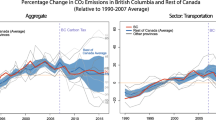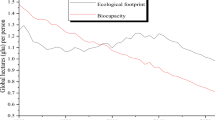Abstract
This paper empirically examines the effects of urbanization and income inequality on CO2 emissions in the BRICS economies (i.e., Brazil, Russia, India, China, and South Africa) during the periods 1994–2013. The method we used is the panel quantile regression, which takes into account the unobserved individual heterogeneity and distributional heterogeneity. Our empirical results indicate that urbanization has a significant and negative impact on carbon emissions, except in the 80th, 90th, and 95th quantiles. We also quantitatively investigate the direct and indirect effect of urbanization on carbon emissions, and the results show that we may underestimate urbanization’s effect on carbon emissions if we ignore its indirect effect. In addition, in middle- and high-emission countries, income inequality has a significant and positive impact on carbon emissions. The results of our study indicate that in the BRICS economies, there is an inverted U-shaped environmental Kuznets curve (EKC) between the GDP per capita and carbon emissions. The conclusions of this study have important policy implications for policymakers. Policymakers should try to narrow the income gap between the rich and the poor to improve environmental quality; the BRICS economies can speed up urbanization to reduce carbon emissions, but they must improve energy efficiency and use clean energy to the greatest extent in the process.


Similar content being viewed by others
References
Alexander M, Harding M, Lamarche C (2011) Quantile regression for time-series-cross-section data. Int J Stat Manag Syst 6(1-2):47–72
Ali HS, Abdul-Rahim AS, Ribadu MB (2017) Urbanization and carbon dioxide emissions in Singapore: evidence from the ARDL approach. Environ Sci Pollut Res 24(2):1967–1974
Baltagi B (2008) Econometric analysis of panel data. John Wiley & Sons, New York
Barnes DF, Krutilla K, Hyde WF (2005) The urban household energy transition: social and environmental impacts in the developing world. Resources for the Future, Washington, DC
Berthe A, Elie L (2015) Mechanisms explaining the impact of economic inequality on environmental deterioration. Ecol Econ 116:191–200
Binder M, Coad A (2011) From Average Joe’s happiness to Miserable Jane and Cheerful John: using quantile regressions to analyze the full subjective well-being distribution. J Econ Behav Organ 79(3):275–290
Boyce JK (1994) Inequality as a cause of environmental degradation. Ecological Economics 11(3):169–178
Canay IA (2011) A simple approach to quantile regression for panel data. Econ J 14(3):368–386
Cole MA (2007) Corruption, income and the environment: an empirical analysis. Ecol Econ 62(3):637–647
Damette O, Delacote P (2012) On the economic factors of deforestation: what can we learn from quantile analysis? Econ Model 29(6):2427–2434
Fan Y, Liu LC, Wu G, Wei YM (2006) Analyzing impact factors of CO2 emissions using the STIRPAT model. Environ Impact Assess Rev 26(4):377–395
Flores CA, Flores-Lagunes A, Kapetanakis D (2014) Lessons from quantile panel estimation of the environmental Kuznets curve. Econ Rev 33(8):815–853
Galvao AF (2011) Quantile regression for dynamic panel data with fixed effects. J Econ 164(1):142–157
Gangadharan L, Valenzuela MR (2001) Interrelationships between income, health and the environment: extending the Environmental Kuznets Curve hypothesis. Ecol Econ 36(3):513–531
Gawande K, Berrens RP, Bohara AK (2001) A consumption-based theory of the environmental Kuznets curve. Ecol Econ 37(1):101–112
Gouldson A, Murphy J (1997) Ecological modernization: economic restructuring and the environment. Polit. Q. 68:74–86
Grunewald N, Klasen S, Martínez-Zarzoso I, Muris C (2017) The trade-off between income inequality and carbon dioxide emissions. Ecol Econ 142:249–256
Hao, L., & Naiman, D. Q. (2007) Quantile regression (No.149). Sage, Los Angeles
Haseeb M, Hassan S, Azam M (2017) Rural–urban transformation, energy consumption, economic growth, and CO2 emissions using STRIPAT model for BRICS countries. Environ Progress Sustain Energy 36(2):523–531
Heerink N, Mulatu A, Bulte E (2001) Income inequality and the environment: aggregation bias in environmental Kuznets curves. Ecol Econ 38(3):359–367
Joan MA (1995) Distributional issues in ecological economics. Rev Soc Econ 53(4):511–528
Jorgenson A, Schor J, Huang X (2017) Income inequality and carbon emissions in the United States: a state-level analysis, 1997–2012. Ecol Econ 134:40–48
Jun Y, Zhong-kui Y, Peng-fei S (2011) Income distribution, human capital and environmental quality: empirical study in China. Energy Procedia 5:1689–1696
Kato K, Galvao AF (2010) Smoothed quantile regression for panel data. Discussion paper, University of Iowa
Koenker R, Bassett G Jr (1978) Regression quantiles. Econ: J Econ Soc 46:33–50
Koenker R (2004) Quantile regression for longitudinal data. J Multivar Anal 91(1):74–89
Lamarche C (2010) Robust penalized quantile regression estimation for panel data. J Econ 157(2):396–408
Lamarche C (2011) Measuring the incentives to learn in Colombia using new quantile regression approaches. J Dev Econ 96(2):278–288
Lancaster T (2000) The incidental parameter problem since 1948. J Econ 95(2):391–413
Leitao A (2010) Corruption and the environmental Kuznets curve: empirical evidence for sulfur. Ecol Econ 69(11):2191–2201
Lim GC, McNelis PD (2016) Income growth and inequality: the threshold effects of trade and financial openness. Econ Model 58:403–412
Lin F, Fu D (2016) Trade, institution quality and income inequality. World Dev 77:129–142
Martínez-Zarzoso I, Maruotti A (2011) The impact of urbanization on CO2 emissions: evidence from developing countries. Ecol Econ 70(7):1344–1353
McGranahan G, Jacobi P, Songsore J, Surjadi C, Kjellen M (2001) The citizen at risk: from urban sanitation to sustainable cities. Earthscan, London
Mol AP, Spaargaren G (2000) Ecological modernization theory in debate: a review. Environ Polit 9(1):17–49
Neyman, J., & Scott, E. L. (1948) Consistent estimates based on partially consistent observations. Econometrica: Journal of the Econometric Society: 1–32
Parikh J, Shukla V (1995) Urbanization, energy use and greenhouse effects in economic development: results from a cross-national study of developing countries. Global Environ Chang 5(2):87–103
Poumanyvong P, Kaneko S (2010) Does urbanization lead to less energy use and lower CO2 emissions? A cross-country analysis. Ecol Econ 70(2):434–444
Ravallion M, Heil M, Jalan J (2000) Carbon emissions and income inequality. Oxford Econ Papers 52(4):651–669
Sadorsky P (2014) The effect of urbanization on CO2 emissions in emerging economies. Energy Econ 41:147–153
Saidi K, Mbarek MB (2017) The impact of income, trade, urbanization, and financial development on CO2 emissions in 19 emerging economies. Environ Sci Pollut Res 24(14):12748–12757
Scruggs LA (1998) Political and economic inequality and the environment. Ecol Econ 26(3):259–275
Sojkova L (2014) The impact of FDI on GDP and employment in the Liberec Region. Dissertation, Brno
Solarin SA, Lean HH (2016) Natural gas consumption, income, urbanization, and CO2 emissions in China and India. Environ Sci Pollut Res 23(18):18753–18765
Solarin SA, Al-Mulali U, Ozturk I (2017) Validating the environmental Kuznets curve hypothesis in India and China: the role of hydroelectricity consumption. Renew Sust Energ Rev 80:1578–1587
Wilkinson R, Pickett K (2010) The spirit level: why equality is better for everyone. Penguin Books, UK
Wolde-Rufael Y, Idowu S (2017) Income distribution and CO2 emission: a comparative analysis for China and India. Renew Sust Energy Rev 74:1336–1345
Wooldridge JM (2001) Applications of generalized method of moments estimation. J Econ Perspect 15(4):87–100
Yang Y, Liu J, Zhang Y (2017) An analysis of the implications of China’s urbanization policy for economic growth and energy consumption. J Cleaner Prod 161:1251–1262
York R, Rosa EA, Dietz T (2003) STIRPAT, IPAT and ImPACT: analytic tools for unpacking the driving forces of environmental impacts. Ecol Econ 46(3):351–365
York R (2007) Demographic trends and energy consumption in European Union Nations, 1960–2025. Soc Sci Res 36(3):855–872
You WH, Zhu HM, Yu K, Peng C (2015) Democracy, financial openness, and global carbon dioxide emissions: heterogeneity across existing emission levels. World Dev 66:189–207
Zakaria M, Fida BA (2016) Trade openness and income inequality in China and the SAARC Region. Asian-Pacific Econ Lit 30(2):33–44
Zhang YJ, Jin YL, Chevallier J, Shen B (2016) The effect of corruption on carbon dioxide emissions in APEC countries: a panel quantile regression analysis. Technol Forecast Soc Chang 112:220–227
Zhu HM, You WH, Zeng ZF (2012) Urbanization and CO2 emissions: a semi-parametric panel data analysis. Econ Lett 117(3):848–850
Zhu H, Duan L, Guo Y, Yu K (2016) The effects of FDI, economic growth and energy consumption on carbon emissions in ASEAN-5: evidence from panel quantile regression. Econ Model 58:237–248
Acknowledgements
Our deepest gratitude goes to the Editor, Prof. Philippe Garrigues, and the anonymous referee for their helpful comments and constructive suggestions which ultimately improved the article.
Funding
This research is partly supported by the National Natural Science Foundation of China under Grant Nos.71671062, 71521061, and 71431008.
Author information
Authors and Affiliations
Corresponding author
Additional information
Responsible editor: Philippe Garrigues
Highlights
• This paper investigates the effects of urbanization and income inequality on CO2 emissions in the BRICS economies
• The heterogeneous direct and indirect effects of urbanization on CO2 emissions exist across quantile levels
• Urbanization significantly improves environmental quality in low- and middle-emission countries
• The results indicate that income inequality significantly increases the CO2 emissions at high quantile levels
Rights and permissions
About this article
Cite this article
Zhu, H., Xia, H., Guo, Y. et al. The heterogeneous effects of urbanization and income inequality on CO2 emissions in BRICS economies: evidence from panel quantile regression. Environ Sci Pollut Res 25, 17176–17193 (2018). https://doi.org/10.1007/s11356-018-1900-y
Received:
Accepted:
Published:
Issue Date:
DOI: https://doi.org/10.1007/s11356-018-1900-y




